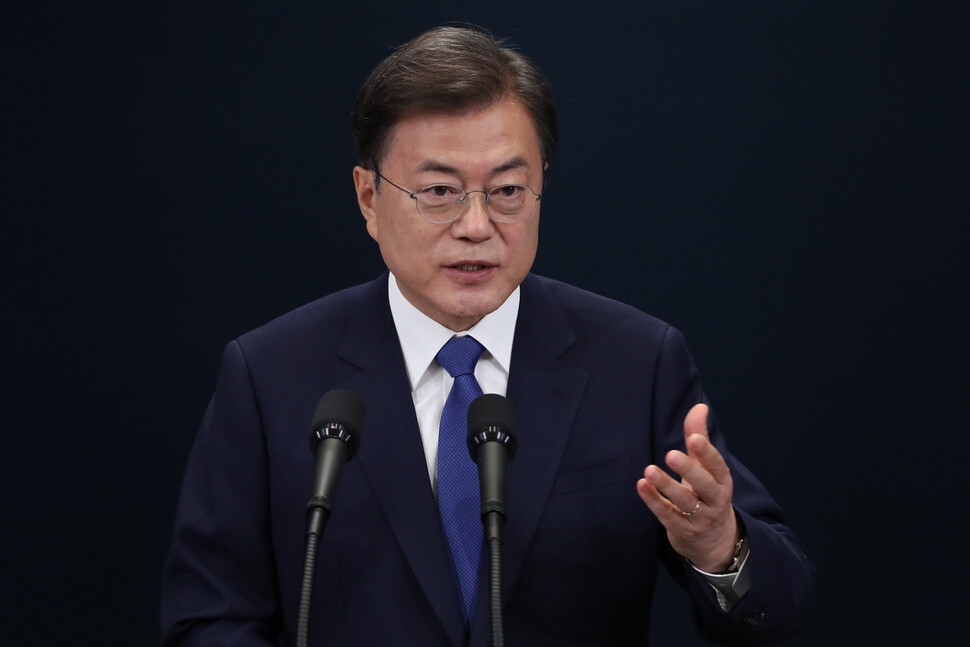hankyoreh
Links to other country sites 다른 나라 사이트 링크
[Editorial] Moon hopefully continues to devote himself to reforms throughout remainder of his term

South Korean President Moon Jae-in gave a special address as he marked three full years since taking office on May 10, 2017. Based on his confidence in a coronavirus disease control response that has drawn praise from around the world, he declared his aim of using the crisis as a driving force to elevate South Korea’s national standing and achieve a “world-leading Republic of Korea.”
Many are currently speculating that all of human life -- from daily activities to the international order -- is poised to be divided into “before and after the coronavirus.” President Moon’s declaration of a “post-coronavirus” vision as he enters the fourth year of his term amid a national crisis seemed like a timely gesture, in that it presented an aim behind which the public’s heightened energies can be rallied. We look forward to seeing the administration channel its energies into achieving his governance vision through a cautious and detailed response.
Moon identified governance goals in five areas for “transforming crisis into opportunity.” To begin with, he announced plans to reinforce the public healthcare system and infectious disease response capabilities, including upgrading the Korea Centers for Disease Control Prevention (KCDC) into a full-fledged ministry. These are things that cannot be put off amid fears of a second wave of community infections following a recent cluster of cases associated with clubs in Seoul’s Itaewon neighborhood.
Moon’s biggest emphasis was on planning a proactive response to prepare for changes to the international order once the coronavirus situation has passed. In particular, he devoted over half of his address to explaining his plans for overcoming crises related to the economy and individual livelihoods. He announced plans for developing South Korea into “the world’s factory of cutting-edge technology” by leveraging its ICT and biotech capabilities to promote new growth industries and using its outstanding disease control infrastructure as a lure to attract overseas investors looking for a “safe bet.”
Additionally, he announced his aim of pursuing a “Korean New Deal” that involves creating jobs through the establishment of data collection and infrastructure and the fostering of “untact” (non-face-to-face) industries. He further pledged to lay the groundwork for “employment insurance for all South Koreans.” This seems to be a progressive vision, going beyond the mere discovery of industry growth engines to combine it with livelihood measures such as job creation and a stronger social safety net. Particularly noteworthy was his announcement that he would ensure the “key values of privacy protection and upholding the public service character of healthcare and education” in the pursuit of the Korean New Deal.
Regarding inter-Korean relations, Moon announced plans to pursue ideas for cooperation based on the new concept of “human security,” which encompasses areas such as joint responses to disasters and disease. While a joint response to the virus outbreak may be the starting point, the potential avenues for inter-Korean relations should be quickly broadened to other areas such as inter-Korean railroad linkage efforts and permissions for individual tourist visits.
It is unfortunate that the special address did not include any reference to a “Green New Deal” for simultaneously resolving climate and economy issues. We look forward to the in-depth examination and presentation of a bold vision for also leading the effort to overcome the climate crisis, which is being seen as harboring the seeds of global catastrophe. Also absent were any plans for completing unfinished reforms to the prosecutors and other institutions of power, or any messages about the political world as “cooperative governance.”
Moon explained that he had “focused on measures for overcoming the economic crisis and national difficulties we are facing today.” He must not forget that the public sentiments expressed in the Apr. 15 general elections, which handed his party a supermajority for the final years of his term, also reflect demands for an unswerving pursuit of reforms.
Please direct comments or questions to [english@hani.co.kr]

Editorial・opinion
![[Column] Season 2 of special prosecutor probe may be coming to Korea soon [Column] Season 2 of special prosecutor probe may be coming to Korea soon](https://flexible.img.hani.co.kr/flexible/normal/500/300/imgdb/original/2024/0426/3317141030699447.jpg) [Column] Season 2 of special prosecutor probe may be coming to Korea soon
[Column] Season 2 of special prosecutor probe may be coming to Korea soon![[Column] Park Geun-hye déjà vu in Yoon Suk-yeol [Column] Park Geun-hye déjà vu in Yoon Suk-yeol](https://flexible.img.hani.co.kr/flexible/normal/500/300/imgdb/original/2024/0424/651713945113788.jpg) [Column] Park Geun-hye déjà vu in Yoon Suk-yeol
[Column] Park Geun-hye déjà vu in Yoon Suk-yeol- [Editorial] New weight of N. Korea’s nuclear threats makes dialogue all the more urgent
- [Guest essay] The real reason Korea’s new right wants to dub Rhee a founding father
- [Column] ‘Choson’: Is it time we start referring to N. Korea in its own terms?
- [Editorial] Japan’s rewriting of history with Korea has gone too far
- [Column] The president’s questionable capacity for dialogue
- [Column] Are chaebol firms just pizza pies for families to divvy up as they please?
- [Column] Has Korea, too, crossed the Rubicon on China?
- [Correspondent’s column] In Japan’s alliance with US, echoes of its past alliances with UK
Most viewed articles
- 1Is Japan about to snatch control of Line messenger from Korea’s Naver?
- 2‘We must say no’: Seoul defense chief on Korean, USFK involvement in hypothetical Taiwan crisis
- 3Up-and-coming Indonesian group StarBe spills what it learned during K-pop training in Seoul
- 4[Editorial] Korea’s surprise Q1 growth requires objective assessment, not blind fanfare
- 5Division commander ordered troops to enter raging flood waters before Marine died, survivor says
- 6[Column] Park Geun-hye déjà vu in Yoon Suk-yeol
- 7[Editorial] New weight of N. Korea’s nuclear threats makes dialogue all the more urgent
- 8Korea sees more deaths than births for 52nd consecutive month in February
- 9Is N. Korea threatening to test nukes in response to possible new US-led sanctions body?
- 10Korea’s 1.3% growth in Q1 signals ‘textbook’ return to growth, says government